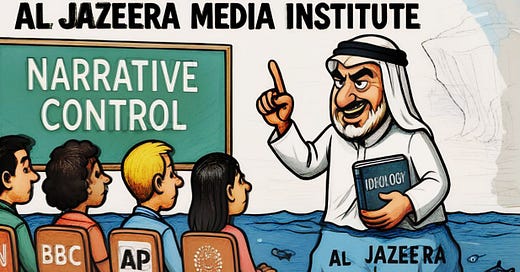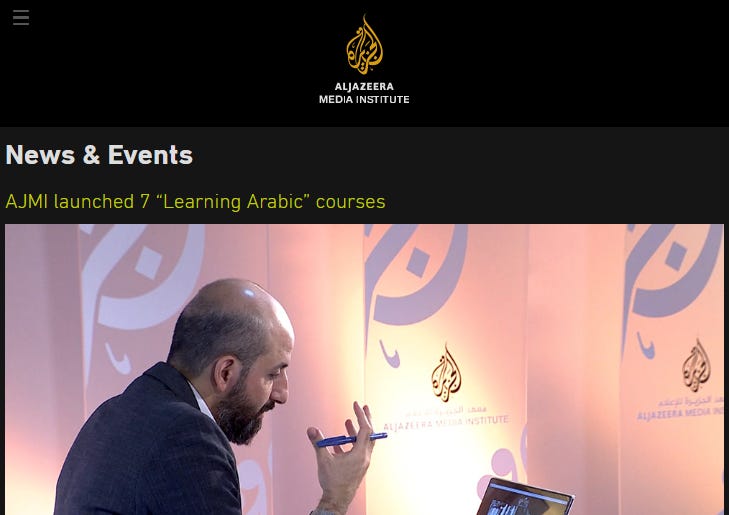Al Jazeera Media Institute: The Tip of the Iceberg of Qatar's Trojan Horse
AJMI: Where Nazi, Communist, Jihadi Propaganda Is Taught
When most people hear the name Al Jazeera, they think of a website, a satellite news channel, maybe a viral clip on social media. What they don’t think about is everything that lies beneath the surface—because Al Jazeera isn’t just a media outlet, it’s a global influence operation. Its real power doesn’t come from how many people watch its broadcasts or read its articles. Part of its power comes from how many journalists it trains.
Through the Al Jazeera Media Institute (AJMI), Qatar has found a way to expand its narrative reach not by winning trust in its own brand, but by ensuring its worldview is echoed throughout the global press—by thousands of reporters, editors, and producers who now unconsciously speak in Al Jazeera’s voice, even if they work for entirely different organizations.
In February 2004, the Qatari government opened AJMI in Doha. Marketed as a hub for media professionalism, it has since trained over 75,000 journalists from around the world. These alumni now hold positions at virtually every major media outlet worldwide—from CNN, BBC, Reuters, AFP, to of course, Al Jazeera itself. This isn’t a fringe effort. Major international media organizations pay thousands of dollars to send their staff to AJMI—but what they get with is not just technical skill—it’s a worldview shaped by Qatar that funds terror and grooms the press to see it as “justice.”
The figure of 75,000 journalists trained by AJMI is actually a significant undercount of Qatar’s true media influence. Many of these professionals return to their home countries and go on to train their local teams, colleagues, and aspiring journalists in universities, effectively multiplying the reach of Qatari-aligned narratives far beyond the initial classroom.
This cascading effect means that the number of media professionals indirectly shaped by AJMI’s curricula is exponentially larger, as each trained journalist becomes a vector for spreading Qatar’s worldview—deeply embedding its influence into local and regional media ecosystems around the world.
AJMI’s course offerings reveal the ideological intent: programs like “How to Tell the Stories of Gaza’s Children,” “How do we Decolonize Journalism,” and similar programs, they aren’t about objectivity—they're about indoctrination. These sessions teach journalists not to report facts, but to frame stories to align with Qatar’s foreign policy: Painting Western democracies as colonial oppressors.
One course, for example, focuses on the use of Artificial Intelligence tools in content production—something serious journalists would caution against as not standard practice in responsible news reporting. While the course includes a disclaimer about “potential ethical risks and challenges of using AI and the need to use it responsibly,” the inclusion of AI as a content creation tool raises concerns about manipulation and the blurring of fact and fiction. One of the results, “Pallywood.”
AJMI is notably opportunistic. When Bashar al-Assad was overthrown in Syria, the Institute quickly launched on-the-ground courses, positioning itself as the voice of “free Syria” for “aspiring journalists”—This to quietly promote a narrative in line with Qatar’s foreign policy priorities.
Another example of a course highlighting the hidden agendas of manipulation through AJMI is a training coordinated with a "human rights NGO." Just weeks after the Hamas-led October 7 massacre, AJMI partnered with an NGO in Turkey to offer training in war coverage, international human rights law, and storytelling in conflict zones. The course trained 17 journalists and focused on how to “report” international law in war and conflict zones, human rights law, the refugee issue, international crimes, and courts, among other topics. The target audience was not newbies or freelancers; it also had a very specific demographic. The course was aimed at journalists in the Arab world and required participants to be under 35 years old, have a full-time job at a media organization as a journalist, and have a minimum of 3 years of experience in journalism to enroll.
Qatar takes its media indoctrination a step further—by targeting children. Offering journalism courses for children. Marketed as a way to nurture “media literacy” and storytelling skills, the program is part of a broader push to embed Qatari-aligned narratives at an early age. This isn’t about teaching kids to critically evaluate facts—it’s about planting ideological seeds early, shaping how a new generation understands the world, conflict, power, and identity. With this expansion, AJMI isn’t just training the current media class—it’s grooming the next one.
Even Arabic language training is part of AJMI’s expansion model. The institute offers Arabic courses to foreign journalists—another tool to deepen narrative alignment and expand cultural reach. It’s not just about what they say—it’s about making sure they say it in Arabic, for the right audiences, with the right message.
Among the group of experts and trainers at the Al Jazeera Media Institute is Ahmed Al Sheikh, one of the most influential figures behind Al Jazeera’s global rise. As the network’s former Editor-in-Chief, Al Sheikh played a central role in developing Al Jazeera’s syndication model—a strategy that enabled the network to distribute its content through partnerships with media organizations worldwide, dramatically expanding its global reach and influence.
His long media career began in Jordan and Kuwait in the 1970s, followed by a stint at BBC Arabic, before he joined Al Jazeera at its founding in 1996. He launched both aljazeera.net and AlJazeera.com, served as the first Managing Editor of the English-language platform, and anchored the channel’s first live talk show. By 2004, he was Editor-in-Chief, steering Al Jazeera to become one of the most watched and controversial news networks in the Arab world and beyond.
Today, as part of AJMI’s leadership, Al Sheikh brings not only decades of media manipulation experience but also deep global connections—and a well-honed talent for turning propaganda into what appears as polished “journalism.” His continued involvement ensures that AJMI is not just a training center—it’s an elite academy for narrative warfare.
In addition to his role at AJMI, Ahmed Al Sheikh serves as Secretary General of the Tawasol Forum for Media, an initiative of a coordinated messaging network “in service of the Palestinian cause.”
Tawasol connects pro-Palestinian journalists and media institutions worldwide, aligning narratives with Qatar’s political agenda—especially regarding Israel, Hamas, and Western policies. Tawasol’s leadership includes individuals with known ties to Hamas and Islamist groups. Tawasol acts as an amplifier for Hamas-aligned propaganda, shaping coverage in multiple languages worldwide.
Another example of teachers from AJMI is Tamer Almisshal, he is also an Al Jazeera journalists. During the Hamas October 7th massacre he glorified the attack, "Gaza brings victory and glory to its homeland and its nation ."
As Former Israel’s Ambassador for Norway wrote on X:
“Imagine this headline: Muslim Brotherhood media representative will lecture to the future generation of Norwegian journalists. It will be a good opportunity for the students to ask him, how does it feel to abuse the important role of the media by spreading terror organization propaganda. Unfortunately there is no need to imagine, it is happening today in Oslo.”
The result of Qatar’s media indoctrination enterprise, “journalists” like him. Knows no facts, works for Norway’s public broadcaster NRK and is convinced the IDF is a terrorist organization. This is the type of people writing and reporting your news.
Youssef Fares, a contributor to Al Jazeera’s Media Institute, has been linked to the U.S.-designated terrorist group Palestinian Islamic Jihad (PIJ), according to a detailed investigation by JewishOnliner. Fares, who has authored articles and contributed to an Al Jazeera Media Institute article on covering the Israel-Hamas war, was photographed at multiple PIJ-sponsored events. In one instance, he received an award directly from PIJ leaders for his media support during the group’s attacks on Israel. His social media features images with armed terrorists, children in combat gear, and tributes to high-ranking PIJ operatives—evidence of not just affiliation but ideological alignment.
The JewishOnliner investigation further revealed Fares’ participation in Hamas-hosted media workshops, including a 2017 panel titled “Mechanisms for Dealing with the Zionist Media.” He has also written for official PIJ platforms and used his Telegram channel to glorify the October 7th Hamas massacre. Fares’ platform is not merely a journalistic failing—it represents the penetration of extremist propaganda into mainstream media under the cover of professional training.
The Al Jazeera Media Institute is modeled after the world’s most dangerous propaganda machines: Like the USSR, which heavily invested in global propaganda—not just through state outlets, but by training foreign journalists, embedding Qatari-aligned narratives into newsrooms worldwide. Joseph Goebbels emphasized manufacturing consent through total control of journalism, film, and education—centralizing both message and messenger. AJMI mirrors this model, using media not for reporting facts, but for emotional manipulation, ideological framing, and myth-making, particularly through anti-Israel and anti-West messaging. Its programs for children echo the indoctrination tactics of the Hitler Youth. The Brotherhood’s media and da’wah (outreach) strategy, especially from the 1950s onward, focused on long-term grooming of journalists, academics, and civil society influencers. AJMI adopts this model by normalizing radical narratives under the language of “justice” and “human rights,” embedding Islamist talking points in mainstream discourse.
The ripple effects are everywhere: editors greenlight biased stories, producers frame segments around “occupation” and “decolonization,” and reporters regurgitate Qatari talking points. The result is an inbreed of Nazi, Communist, and Jihadi Propaganda, masquerading as journalism
And AJMI is only one piece of the machine. It is only the tip of the iceberg. In 2019, Qatar launched Media City Qatar—a massive, state-backed development aimed at hosting and funding international news organizations, media research centers, content creators, game developers, tech incubators, international universities, production studios and more.
It offers tax incentives, legal protection, and full infrastructure—so long as you stay within Qatar’s ideological lines. Together with AJMI, it forms a complete influence pipeline: train the journalists, then fund and house the platforms they work for. Control both the messenger and the message.
Qatar doesn’t need to control the media. It just needs to train it. And if you’re wondering why headlines around the world downplay terrorists, disproportionately attack Israel, and consistently demonize the West while whitewashing regimes like Iran or groups like Hamas—you’re seeing the results. This is not accidental bias. It is the outcome of a deliberate, long-term campaign to reshape global media in Qatar’s image.
The Al Jazeera Media Institute isn’t just a journalism school. It is the front line of an ideological war—until we recognize that, Qatar is winning.



























Thorough and well thought out. I knew Al Jazeera was a propaganda tool but had no idea how far its reach extended